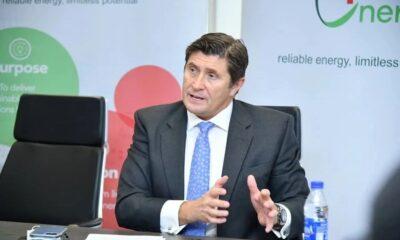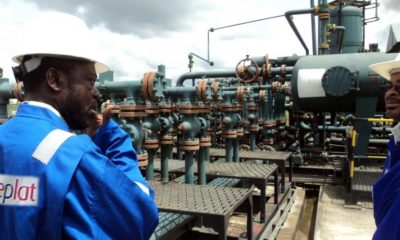Company News
ExxonMobil-Seplat Share Deal: Not an Asset Deal
Published
3 years agoon

Apparently worried by unending inquiries by its happy investors and stakeholders who barely a week ago welcomed its share deal with ExxonMobil, Seplat Energy on Monday March 7 said no event of cancellation of the transaction has occurred.
Nigeria’s corporate and business world, especially the oil and gas industry, was literally lit and agog following the announcement by Seplat Energy Plc., a leading indigenous energy company listed on the Nigerian Exchange and the London Stock Exchange, and Exxon Mobil Corporation, Delaware, USA (ExxonMobil) that they had entered into an agreement for the Seplat to acquire the entire share capital of Mobil Producing Nigeria Unlimited (MPNU) from the latter, subject, however, to the usual Ministerial Consent.
The President, ExxonMobil Upstream Oil and Gas, Liam Mallon, said the company sold its equity interest in its shallow-water business, Mobil Producing Nigeria Unlimited (MPNU), to Seplat Energy through Seplat’s wholly-owned Seplat Offshore.
“Seplat Energy has become aware of newspaper and social media reports that the Nigerian National Petroleum Company Limited (NNPC) has exercised a right of pre-emption under the NNPC/Mobil Producing Nigeria Unlimited (MPNU) Joint Operating Agreement (JOA).
“The Company wishes to clarify that the Sale and Purchase Agreement (SPA), earlier announced on the 25 February 2022, deals with the acquisition of the entire share capital of MPNU’s shareholders, Mobil Development Nigeria Inc. and Mobil Exploration Nigeria Inc., being entities of Exxon Mobil Corporation registered in Delaware (ExxonMobil). MPNU, is not a party to the SPA and continues to hold its interests, rights and obligations under the NNPC/MPNU JOA,” Seplat Energy said in a statement at the Nigerian Exchange Limited (NGX).
This announcement was made pursuant to Rule 17.10 of the Rulebook of the Nigerian Exchange, 2015 (Issuer’s Rule).
“There are also some reports that the SPA between ExxonMobil and Seplat Energy has been terminated. Seplat Energy confirms that no event of termination has occurred, and the SPA remains valid and subsisting.
Seplat Energy is a compliant company and will continue to follow the laws of the Federal Republic of Nigeria,” the statement read.
Interestingly, the ExxonMobil-Seplat transaction is not the first in the industry in recent times. Many industry watchers wondered why the NNPC did not exercise the same pre-emption action in the divestments by SPDC.
Rendering highlights of the deal, which is the first of its kind since the coming on stream of the Petroleum Industry Act (PIA), Seplat, on its part, put the purchase price at $1,283 million plus up to $300 million contingent consideration.
The transaction, it said, would create one of the largest independent energy companies on both the Nigeria Stock Exchange and London Stock Exchange as well as bolster Seplat Energy’s ability to drive increased growth, profitability and overall stakeholder prosperity, delivering 186 per cent increase in production from 51,000 bpd to 146,000 bpd or 170 per cent increase in 2P liquids reserves, from 241 MMbbl to 650 MMbbl.
In addition, it was expected to deliver a 14 per cent increase in 2P gas reserves from 1,501 Bscf to 1,712 Bscf, plus significant undeveloped gas potential of 2,910 Bscf (JV: 7,275 Bscf).
Nigerians are excited as they await the final Ministerial Consent to bring such strategically important national assets fully into Nigerian ownership alongside the Nigerian National Petroleum Corporation, NNPC, the exiting Joint Venture Partner. This is in line with government’s objective to achieve a pragmatic, progressive and just energy transition for Nigeria.
In its incisive analysis, Wood Mackenzie (WoodMac), a global and reputable intelligence provider that empowers decision-makers with unique insights on the world’s natural resources, lauded the deal saying it was a win-win for Seplat, ExxonMobil, and the Nigerian government, offering huge upside for oil and gas.
Very instructively, Mackenzie added: “Because this is a corporate acquisition, NNPC has no rights to pre-empt a deal under the Joint Operating Agreement (JOA), which governs the JV. This means that ministerial consent would be the only hurdle remaining, although nothing can be taken for granted.
A Misinterpretation of Joint Venture Agreement
Unfortunately, amid this local and international acclaim, the NNPC appears strangely more interested in throwing spanner in the works. In a move to block the transaction, the NNPC, as widely reported in the media, has through its Group Managing Director (GMD), Mele Kyari, written to MPNU, notifying it of its intention to exercise a Right of Pre-emption over the deal.
“We are aware that you reached an agreement to divest from onshore and shallow waters JVs…. Clearly we are interested”, the GMD was quoted as stating.
Meanwhile, a recently published article in support of NNPC’s action quoted purported oil industry source of affirming NNPC’s rights under the law, to exercise such pre-emptive powers.
NNPC hinges its move on a June 28, 1990 Joint Operating Agreement between it and Mobil Producing Nigeria as it pertains to ‘Participating Interest”.
Regarding transfer and assignment of interest, Article 19.4 provides: Subject to sub-clauses 19.1 and 19.2, if any Party has received an offer from a third Party, which it desires to accept, for the assignment or transfer of its participating hereunder (the “Transferring Party”), it shall give the other Party prior right and option in writing to purchase such Participating Interest as provided in sub-clauses 19. 4.1 to 19 .4.2.
Sub-clause 19.4.1 provides: The Transferring Party shall first give notices to the other Party, specifying therein the name and address of the aforementioned third Party and the terms and conditions (including monetary and other consideration) of the proposed assignment and transfer.
Sub-clause 19 .4.2 states: “Upon receipt of the notice referred to in Sub-clause 19. 2.1, the other Party may within thirty (30) days thereafter, request in writing the assignment and transfer of such Participating Interests to it, in which event the assignment or transfer shall be made to it on the same or equivalent terms”.
Meanwhile, these provisions could not be read or understood in isolation of the definition of a “Participating Interest” by the same Agreement.
Article 1.24 states: “Participating Interest means the undivided percentage interest from time to time held by the Parties in the concession (s), the Joint Property and rights and obligations under this Agreement, namely: sixty per cent (60%), in case of NNPC; and forty (40 per cent), in the case of Mobil”.
Thus, these provisions clearly show that the NNPC is absolutely mixing things up because the transaction that happened between Seplat and ExxonMobil, Delaware, USA, was nothing close to a transfer of a “Participating Interest”. No! Seplat did not deal with Mobil Nigeria producing Unlimited (MNPU) the Party in partnership with NNPC. Rather, it transacted business with ExxonMobil, Delaware, the parent company, which acted within its rights, as it pleased and in line with its business/investment strategy, to dispose of all its shares in MNPU, which owns the said assets in Nigeria.
This is the major fact NNPC needs to get right so it could stop convoluting a very simple matter and making Nigeria a laughing stock before the international business community, as it visibly has no Right of First Refusal (RFR) to exercise on this transaction.
Of recent, the NNPC, and analysts pushing its case have argued that with its transition into a registered profit-making and limited liability company vide the PIA, it was out to reshape and optimise its portfolio by acquiring assets with high performance, low vulnerability and huge gas potential. For this reason, it prioritises the acquisition of divested assets under MPNU JV over those in Shell Petroleum Development Company (SPDC) JV. In other words, NNPC‘s sudden interest in the deal and taking over the entire JV (if it had the legal backing) is all about the attractiveness of the assets in question. As a government-backed entity, is it not supposed to be more interested in taking over perceived more vulnerable assets with higher security and production issues? If it is only interested in ‘juicy’ fleshes of the oil and gas industry, who does it expect to deal with the hard bones?
Worse, it is not even as if the NNPC is known to run these things by itself. Most Nigerians know how and where these portfolios end up.
Besides, the NNPC does not enjoy popularity as one of the managers. If the NNPC were to be an airline, it is to be wondered how many Nigerians would be confident to fly in its planes. If NNPC were a hospital, how many Nigerians would surrender their lives to it to manage?
As the sole importer of fuel, Nigerians are still dealing with not only intermittent biting fuel scarcity, but they are also yet to recover from the importation of toxic fuel that have wrecked vehicles and put households through hardships.
Worse, the NNPC is yet to tell Nigerians how the nation’s daily fuel consumption jumped from about 30 million litres about seven years ago to about 102 million litres and above.
Under NNPC’s watch, the refineries have degenerated from producing enough for local consumption, to producing little, and now nothing. In 2020, NNPC recorded N10.27 Billion in operational expenses without refining a single drop of fuel. It is unable to fix any of the refineries, even with the award of a USD1.5 Billion contract last year to fix the Port Harcourt refinery.
The NNPC has been struggling to meet its statutory obligations to the Federation Account in recent years. Despite the surge in oil prices in the international market, it was unable to remit anything to the Federation Account in January 2022, making it the second time within a year, as it was the case in April 2021. In fact, with a deficit of approximately N2 Trillion out of its projected N2.511 Trillion, NNPC was only able to disburse N542 billion as against the N2.511 Trillion it was budgeted to contribute. The Nigeria Governors Forum have protested the development.
Therefore, many Nigerians have wondered why a debt-burdened NNPC is so quick to accumulate more debts vide the $5 billion corporate finance commitment from the African Export-Import Bank (Afreximbank) to “acquire, invest and operate energy-producing assets in Nigeria as part of NNPC’s growth strategy following its incorporation as a limited liability company”. It is important to note that unlike other businesses that would secure their loans by their assets, NNPC rides on government’s back.
The question of prioritisation of gas
Meanwhile, it is reported that NNPC’s interest in taking 100 possession of the assets in question was informed by its efforts not to risk a another partner on the NNPC MPNU JV that might not see the monetisation of the assets gas component as a priority. This should not even be considered given Seplat’s profile in gas investment and its leading role in Nigeria’s energy transition. It produced 20,758 boepd gas in 2021 and supplies 30 per cent of gas to power Nigeria. It became the first company to record a 50-50 venture with the NNPC through the Seplat/NNPC gas plant project – ANOH Gas Processing Company (AGPC) where Seplat easily raised $260 Million through a consortium of banks to fund its part of $650 Million financing for the ANOH Gas Processing Plant.
Against these backdrops, it is understandable why industry players believe that the NNPC has not only misfired, but is also overreaching itself, playing up those needless interferences that discourage investors. It should retreat.
You may like
-
Seplat Energy CEO Roger Brown Acquires 50,000 Additional Shares, Strengthens Stake in Company
-
Seplat Energy Announces $650m Bond Offer as Part of Debt Refinancing Strategy
-
Seplat Unveils $320 Million Plan to Double Oil Production in 2025
-
Reps Summon 38 Oil Firms Over N9.4tn Unpaid Royalties and Levies
-
Nigeria Secures $6.7 Billion Energy Sector Investment in 2024
-
ExxonMobil Proposes $10bn Investment in Deep-Water Oil Operations in Nigeria
















